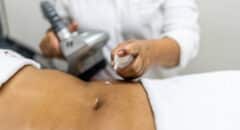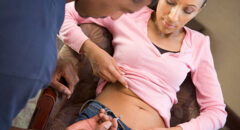
Ayesha Curry is sparking a conversation about how people talk about pregnancy as women age.
The actress, author and chef recently announced that she and her husband, NBA star Stephen Curry, are expecting their fourth child, adding to their family of five. Ayesha, 34, shared her pregnancy news in the cover story for her website, Sweet July, where she reflected on her experiences being pregnant in her mid-30s versus her 20s.
"What's been really interesting has been my doctor's appointments," Ayesha wrote. "I'm in my 30s, and so there's all this paperwork referring to the experience as a 'geriatric pregnancy' and all the concerns that come along with that."
Ayesha gave birth to her eldest child, daughter Riley, nearly 12 years ago, at the age of 22. She was in her mid-20s when she welcomed their second daughter, Ryan, three years later, in 2015, and then in her late 20s when she gave birth to their son, Canon, in 2018, according to ABC News.

Ayesha is in the company of many women, who are choosing to have children later in life. According to the National Institutes of Health, about 20 percent of women in the U.S. now have their first child after age 35.
As more women choose to have children later in life, Ayesha hopes to see a shift in the narrative surrounding pregnancy and age. She believes that the term "geriatric pregnancy" can be alarming and feels that the conversation needs to be more nuanced.
"I think there's something that needs to be more nuanced when it comes to women, their age, and conversations around having children," Ayesha wrote. "Many women in their 30s and 40s are going through this for the first time, and being told you're 'old' feels alarming and wild. I think the narrative needs to be shifted a little bit."
RELATED: There’s More To Ayesha Curry Than The Title ‘NBA Wife…’
The term "geriatric pregnancy" is used to describe pregnancies in women over the age of 35. While this term is still commonly used in the medical community, it has been criticized for its negative connotations. The American College of Obstetricians and Gynecologists (ACOG) now uses the term "advanced maternal age" instead.
Despite these challenges, Ayesha's journey with advanced maternal pregnancy has been one of joy and excitement. She has embraced this chapter of her life with grace and positivity, inspiring many women to do the same.
The mother of three also noted one significant distinction in this pregnancy.
"...One of the biggest differences [of this pregnancy] is a new understanding that this really does pass by in the blink of an eye. And in the blink of an eye, it could also all be taken away. That's encouraged me to slow down and take in every single little thing — especially with it being my last pregnancy," she said adding that after deciding to stop at three kids, she and Stephen agreed to have one more. "For me, the decision came from always finding myself looking around and feeling like somebody was missing. I would load up the car and think, ‘Oh, I forgot something.' But nobody was forgotten."
With her wealth of experience and knowledge, Ayesha is approaching her last pregnancy with a slightly different perspective.
"I was really stubborn in my earlier pregnancies," she shared. "And that hurt me in the end. It made things really hard on me. I had to learn to put my pride aside and realize it was okay to take help, to have people around me help and to not shy away from it."

"And I'm still trying to figure out what building my village looks like. I feel like it's never complete, right?" Ayesha continued. "There's always people coming in, people leaving, and people here forever. And that's okay."
She's also learned the importance of having a friend group to lean on.
"I don't necessarily know if I've ever been a girl's girl in that sense, but now as I'm getting older, I'm realizing it's really nice to have that friend group chat," Ayesha added.

Tips for safely navigating "advanced maternal age" pregnancy
Pregnancies in women over 35 are considered to be at higher risk for certain complications, such as gestational diabetes, high blood pressure, and chromosomal abnormalities. As a result, women in this age group may require additional screenings and tests to monitor their health and the health of their baby.
Despite the risks, many women in "advanced maternal age" can deliver healthy babies. Here are a few tips from the Mayo Clinic to keep you healthy throughout your pregnancy:
- Make a preconception appointment. Before getting pregnant, talk to your healthcare provider about your overall health. Discuss lifestyle changes that improve your chances of a healthy pregnancy and baby. Address concerns you might have about fertility or pregnancy. Ask about how to boost the odds of conception. Also, ask about options if you have trouble getting pregnant.
- Seek regular prenatal care. When you're pregnant, keep up with prenatal visits. They allow your healthcare provider to monitor your health and your baby's health. Mention any symptoms that concern you. Talking to your healthcare provider is likely to put your mind at ease.
- Eat a healthy diet. During pregnancy, you'll need more folic acid, calcium, iron, vitamin D and other essential nutrients. If you're already eating a healthy diet, keep it up. A daily prenatal vitamin can help fill any gaps. Begin taking a prenatal vitamin a few months before getting pregnant.
- Gain weight wisely. Gaining the right amount of weight can support your baby's health. It can make it easier to shed extra pounds after delivery too. Work with your healthcare provider to put together a plan that's right for you.
- Stay active. Regular physical activity can help ease discomfort during pregnancy, boost energy and improve overall health. It can help increase stamina and muscle strength, which helps with labor and childbirth. Get your healthcare provider's OK before starting or continuing an exercise program. This is especially important if you have an underlying condition.
- Avoid risky substances. Alcohol, tobacco and illegal drugs are off-limits during pregnancy. Check with your healthcare provider before taking any medications or supplements.
- Learn about prenatal testing for chromosomal conditions. Ask your provider about prenatal screening and testing. A commonly used screening test is the prenatal cell-free fetal DNA (cffDNA) screening. This is a method to screen for certain chromosomal conditions in a developing baby, such as Down syndrome. During the screening, DNA from the mother and fetus is taken from the mother's blood. It's screened for the increased chance of specific chromosome problems, such as Down syndrome, trisomy 13 and trisomy 18.








